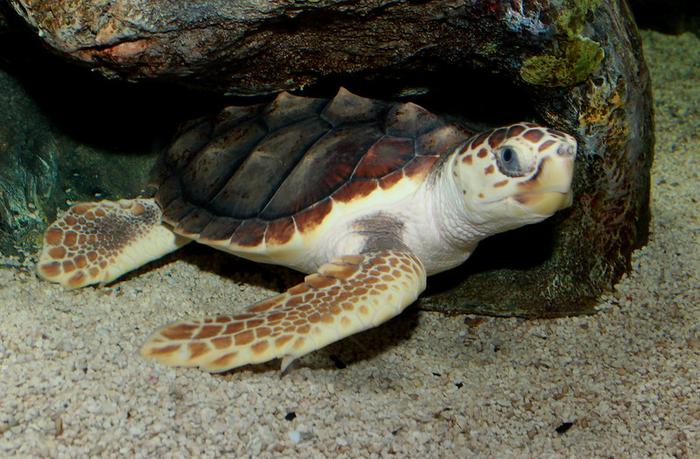Rising sea temperatures along the coastal waters of Italy have led scientists to investigate their implications on the nesting patterns of loggerhead sea turtles, scientifically known as Caretta caretta. The link between climatic shifts and biological responses is a crucial area of study, particularly as pressures from climate change intensify. This research, grounded in analysis of citizen science data, reveals that rising temperatures may be an influential factor in increasing loggerhead nesting along Italy’s coasts, underscoring the need for conservation efforts aimed at preserving natural beach environments.
The loggerhead sea turtle, a species listed as vulnerable by the International Union for Conservation of Nature (IUCN), has seen fluctuations in its nesting patterns, particularly in regions affected by anthropogenic climate change. The study highlights how environmental factors, particularly temperature, can promote turtle nesting activities. Understanding these trends is paramount, as they can serve as indicators of broader ecological shifts that affect multiple species and habitats. Elevated temperatures can lead to altered reproductive cycles, with warmer waters potentially fostering increased nesting opportunities.
Citizen science has played a pivotal role in this research. Through volunteer observations and data collection, researchers have amassed valuable information on marine life and environmental conditions. This collaborative approach not only bolsters scientific analysis but also raises public awareness about conservation issues affecting marine ecosystems. By involving members of the public, the research team has been able to collect extensive and precise data, identifying emerging trends in loggerhead nesting behavior linked to climatic variations.
Moreover, the urgency to act is further emphasized by the ongoing threats against natural beach habitats that loggerhead turtles depend on for nesting. As coastal development and pollution increase, the available space for nesting decreases, impacting hatch success rates. The findings of this study stress the importance of maintaining and restoring natural beach environments to support the loggerhead populations. Conservation measures must be put in place to protect these species during critical nesting periods, emphasizing habitat preservation and the mitigation of human impact on coastal ecosystems.
This research is part of the larger ecological narrative concerning the impacts of both natural and human-induced factors on biodiversity. As ecosystems experience pressures from rising temperatures and habitat destruction, species such as the loggerhead turtle must adapt or face decline. The study indicates that while rising temperatures may initially appear beneficial in terms of increasing nesting rates, the long-term consequences of climate change, including habitat shifts, could offset these short-term gains. Thus, understanding the complex interplay between climatic factors and ecological responses is crucial for future conservation strategies.
In addition to rising temperatures, other human factors like pollution, fishing practices, and coastal infrastructure development negatively impact turtle populations. The study revealed that loggerheads often face significant challenges during their life cycle, from egg to hatchling to adult. Human interference—such as the introduction of invasive species or marine debris—can complicate their survival even further. Researchers have called for comprehensive conservation strategies that not only address climate-induced changes but also tackle these other critical threats to marine life.
Looking toward the future, conserving loggerhead turtles requires a multifaceted approach that combines scientific research, public engagement, and policy implementation. Environmental policymakers must be informed by the latest findings to craft regulations that protect critical nesting habitats while allowing for ecological resilience. Furthermore, public awareness campaigns about the pressures facing sea turtles can foster broader community support for conservation initiatives.
As we progress, technological advancements in monitoring and data analysis will facilitate further understanding of sea turtle behaviors connected to climate change. Such innovations can empower researchers by providing real-time data collection and analysis, enabling them to predict nesting trends and assess the effectiveness of conservation measures over time. It is through continuous research and adaptation that we can best support loggerhead turtles and similar species facing the uncertainties of a changing planet.
In conclusion, the study of rising sea temperatures and their influence on loggerhead turtle nesting along Italy’s coastline serves as a powerful reminder of the interconnectedness of ecological systems. Through collaborative efforts, targeted conservation initiatives, and ongoing research, we can work to ensure the survival of not only loggerhead turtles but a multitude of species that share their fragile marine habitat. Understanding the implications of climate change and human activity on biodiversity is essential in fostering resilience within our natural ecosystems.
This research had profound implications for both scientists and conservationists alike, heralding a call to action for all stakeholders involved in marine conservation. Insights collected from this study will contribute to broader conservation strategies that address climate resilience in marine ecosystems, ultimately paving the way for a sustainable future for loggerhead sea turtles and their habitats.
Subject of Research: Loggerhead Sea Turtle Nesting Patterns in Relation to Rising Sea Temperatures
Article Title: Modeling the impacts of natural and human factors on the hatching success of the loggerhead sea turtle Caretta caretta along the coasts of Italy
News Publication Date: 9-Apr-2025
Web References: http://dx.doi.org/10.1371/journal.pone.0320733
References: Information sources not provided in the content.
Image Credits: Credit: Brian Gratwicke, Flickr, CC-BY 2.0
Keywords: Loggerhead sea turtle, Caretta caretta, climate change, marine conservation, nesting patterns, citizen science, biodiversity, ecological resilience, rising sea temperatures.




